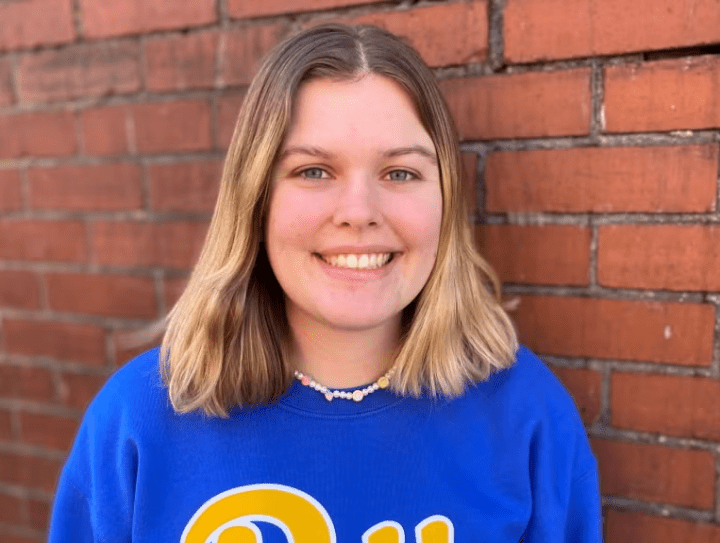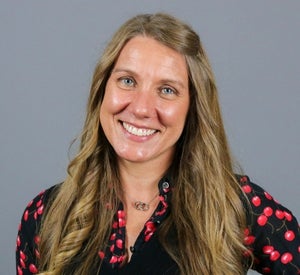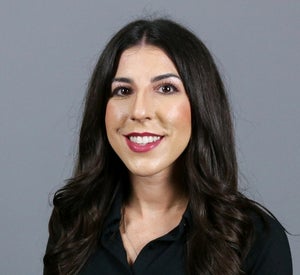The Dietitian Nutritionist (DN) Program offers a post-baccalaureate entry point for students who received a bachelor’s degree that was not from an ACEND accredited Didactic Program in Dietetics, enabling these students to then obtain a Master of Science through Pitt’s Dietitian Nutritionist Program. While completing the three years of courses, all students complete supervised experiential learning which is divided into three major rotations: Community and Public Health Nutrition, Food Service Management and Clinical.
Read more to learn about student Darby Robinson, who utilized the post-baccalaureate entry point in the Dietitian Nutritionist Program.
Choosing the Dietitian Nutritionist Program
I was always interested in health and wellness, but pursuing a career in any other health science profession never piqued my interest. I was fortunate that my undergraduate advisor at Chatham University introduced me to this profession and I have not looked back! I love being able to provide nutrition education to help people improve their relationships with food and improve their health and wellness.
Choosing Pitt
I chose Pitt for a few reasons: First, the Dietitian Nutritionist Program does not run classes through the summer! This gives students the summer months to go out there and get experience through jobs and shadowing. Second, the small class size and close relationships with our professors and third, Pitt’s Dietitian Nutritionist Program works to place their students for their supervised experiential learning so that everyone is guaranteed a site placement.
Post-Baccalaureate Entry Point
The post-baccalaureate path was appealing to me because it allowed me to complete my exercise science degree at Chatham University and easily transfer over to Pitt. I was able to apply much of my undergraduate knowledge to most of my classes in the first year of the Dietitian Nutritionist Program.
Admissions Experience
I remember my interview being very relaxed. The professors that led my interview made me feel comfortable and calmed my nerves. That was something I had never experienced in an interview before.
Experience with Faculty
The relationship between faculty and staff is very close-knit! This was something I was nervous about prior to applying because the faculty-student relationship is something that has always been very important to me (which is why I chose a smaller school for my undergrad). I have really grown close with Instructor Caroline Passerrello and she has been a great mentor to me over the past couple of years by sharing her knowledge of community nutrition. I have also formed a great relationship with Instructor Britney Beatrice as she has really prepared me for what is to come after graduation – which is an area that some universities unfortunately overlook.
Typical Day
In the last year of the program, the majority of days are spent outside the classroom in supervised experiential learning. As a student in the Community Public Health Specialty rotation, I spend time as a teaching assistant and other days out and about in the community. On days that I am working as a teaching assistant for the Nutrition Education class, I will meet with Instructor Passerrello to discuss the details of each class in the morning. Then, we will team-teach for the duration of the class from 9 a.m.-noon. Then I will head home for lunch and get caught up on grading and other assignments
On days that I am at my community supervised experiential learning at Greater Pittsburgh Community Food Bank, I arrive at the site at 8 a.m. My preceptor and I will see what foods are in The Market (their food pantry on site) and will pull education materials, such as recipe cards, to place in The Market for folks to take. We will then either visit some pantries in the Greater Pittsburgh area or attend meetings to discuss where we are for onboarding new partner pantries and what we are doing to improve them.
Favorite Course
“Food Application” was my favorite course! We took it in the first year. The lectures for this class were very interesting and touched on specific aspects of food. With this class, we also had food lab where we cooked lots of yummy foods such as French fries cooked five ways, soft cheese made five different ways (with different milks) and different ways to cook eggs. It was interesting to see that the way we cook food items can affect how they look and taste.
Experience Living in Pittsburgh
I have always enjoyed living in the city. I appreciate how Pittsburgh is a large city, yet also very personable. The people here are so nice compared to other cities I have lived in.
Goals After Graduation
The Dietitian Nutritionist Program at Pitt has really helped with my networking and meeting new people. I hope that through my networks, I can get a job shortly after graduation.
Advice to Prospective Students
School has pressured us to focus a lot on our grades and GPA, but the experience you have along with classes is just as important. If there is a volunteer event that a professor is promoting, I encourage you to say “yes” when it comes to helping!


